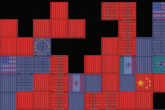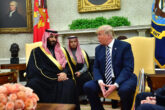June 21, 2016
Transatlantic Economic Statecraft
Building a Balanced Transatlantic Sanctions Policy between the United States and the European Union
Transatlantic cooperation on sanctions is much better today than it was 20 years ago. In 1982 and in 1996, political disputes over sanctions issues saw European countries legislate to block U.S. attempts to extend restrictions against Russia and Iran to European companies. Overcoming this negative historical experience, both sides of the Atlantic have closely coordinated in recent years to tackle common threats, including nuclear proliferation in Iran and Russia’s military intervention in Ukraine. European sanctions played a central role in bringing Iran’s government to serious negotiations that led to the July 2015 Joint Comprehensive Plan of Action. Despite the recent progress on transatlantic sanctions cooperation, however, the U.S.-EU partnership still faces significant challenges.
On the European side, the complex architecture of EU sanctions policy, which features sanctions adopted at the EU level but implemented and enforced at the member-state level, creates inefficiency and confusion. Gaps in intelligence sharing among member states and with the EU itself create legal challenges to the sustainability of sanctions against individuals and entities. Interaction with the private sector is also complicated by different approaches at the EU and national levels.
Meanwhile, on the U.S. side, the tendency of the United States to overreach with sanctions that impact the private sector in Europe creates transatlantic friction. This overreach is sometimes deliberate and sometimes the product of misunderstanding about U.S. sanctions on the part of the private sector. The European Union’s limitations described previously do not help it to efficiently push back on the United States or to encourage and induce Washington to exercise more restraint. Sanctions overreach risks diminishing political support in Europe for sanctions, as recently acknowledged by U.S. Secretary of the Treasury Jack Lew.
Going forward, both the United States and the European Union would benefit from tackling those challenges through cooperation rather than competition.
Cooperation, a preferable and more likely scenario, would involve the U.S. agencies in charge of sanctions policy to show increasing transparency about their enforcement strategies. Cooperative mechanisms such as a mutual license recognition system would go a long way to reduce legal hazards for EU exporters and banks. Cooperation would also involve restraint in the U.S. deployment of secondary sanctions, particularly in instances where EU sanctions already exist.
In the absence of such a cooperative approach, competition could see Europeans opposing the effect of U.S. sanctions on EU companies and banks, for instance, by adopting their own secondary sanctions to target U.S. interests.
EU policymakers must make sanctions policy changes in order to facilitate cooperation with the United States. These policy changes may include further harmonization of licensing mechanisms among member states, more flexible tools for sanctions enforcement (and a more aggressive approach to enforcement generally), and further intelligence sharing. In addition, EU mechanisms to support and assist companies struggling to cope with market opportunities lost because of sanctions should be created to increase the political sustainability of the sanctions policy. Lastly, Europeans should tighten their control on transactions between entities under EU sanctions and entities outside of the EU when they occur in euros or other European currencies, such as the pound, in particular when such transactions are forbidden by EU laws.
Expanding constructive cooperation will enable transatlantic partners to preserve the integrity of the sanctions tool and will ultimately benefit the broader political and security partnership. Specifically, it will help to address common challenges: managing policy adaptation to address evolving threats and the circumvention of sanctions; contingency planning regarding the use of sanctions to address emerging security threats; and countersanctions strategies to protect U.S. and EU interests from the use of sanctions by non-Western powers.
Introduction
Economic sanctions1 (referred to as “sanctions” in this report) have become a tool of choice for the United States and the European Union to advance their security interests and to uphold a rules-based global order. U.S. and European financial and economic power gives both players a competitive advantage in economic warfare and significant clout over state and non-state actors that pose challenges to their interests and values, as well as challenges to international peace and security.
An increasingly unstable security environment, the continuing decline of European defense spending, and resulting limited power-projection capabilities have convinced Europeans of the strong contribution that sanctions can make to their security. The emergence of an EU common foreign and security policy (CFSP) in the aftermath of the Cold War helped member states to create the collective framework for a united sanctions policy. The European willingness and institutional ability to adopt sanctions have served U.S. security interests well, considering Europe’s status as one of the world’s premier trade and financial markets.
U.S. and European financial and economic power gives both players a competitive advantage in economic warfare.
Still, Europeans and Americans see important differences in the utility of sanctions as a coercive tool, as well as in their respective sanctions policies. Sanctions in the European Union come with limits related to both European institutions and member states. Meanwhile, increasingly sophisticated American sanctions have created concerns among European policymakers and private-sector representatives about the coercive and overreaching impact of U.S. sanctions on European companies and banks. “U.S. sanctions overreach” refers to the outsized effects that U.S. sanctions have on the private sector outside of U.S. jurisdiction, for instance in Europe or Asia. This impact limits the autonomy of the European Union to design sanctions policies to meet European strategic objectives. These factors contribute to a structural imbalance that may ultimately undermine the United States’ and the European Union’s ability to use sanctions as well as to coordinate their sanctions policies.
This report does not elaborate on the effectiveness of sanctions; that issue has been well documented over the years by authors who have identified conditions for maximum effectiveness.2 It assumes that sanctions have been, and can be, an effective tool when used strategically. Instead, this report identifies trends and issues that will determine the transatlantic community’s ability to use sanctions jointly and with great impact in the future. It explores the European “conversion” to sanctions, the residual limits to the EU’s approach, and the resulting imbalance that still exists in European cooperation with the United States. It advocates for several steps to help balance the transatlantic partnership and sustain a cooperative relationship on issues of economic statecraft. Finally, it offers steps to secure long-term political support for sanctions.
The full report is available online.
- “Economic sanctions” are those legal measures imposed by a state or a group of states against other countries, non-state groups, companies, or individuals in order to restrain their economic interactions with the state’s or the group of states’ respective trade and/or financial markets. They differ from “political sanctions” such as excluding Russia from the G8 in the aftermath of the Ukraine crisis in 2014. Economic sanctions can take multiple forms: they can be massive (“embargos”) or target specific assets or sectors so as to maximize effect on the country’s decision-making process while minimizing the consequences for the population of that country (“targeted sanctions”); they can target a specific economic sector such as the petroleum industry (“sectoral sanctions”) or simply specific companies or individuals (“individual sanctions”); and they can do so through trade restriction prohibiting the export or import of goods and equipment (“trade sanctions”) or through restrictions on financial transactions (“financial sanctions”). ↩
- There have been multiple studies made on the effectiveness of economic sanctions to achieve foreign policy goals. The following is a non-exhaustive list of works that the author has consulted in writing this report. Gary Hufbauer, Jeffrey Schott, Kimberly Eliott, Barbara Oegg, Economic Sanctions Reconsidered, 3rd edition (Peterson Institute for International Economics: Washington, D.C., November 2007); Thomas Biersteker, Sue E. Eckert, Marcos Tourinho, Zuzana Hudakova, “The Effectiveness of United Nations Targeted Sanctions: Findings from the Targeted Sanctions Consortium (TSC),” (The Graduate Institute Geneva, The Targeted Sanctions Consortium, Watson Institute for International Studies, November 2013); Richard N. Haass, Meghan L. O’Sullivan, Honey and Vinegar: Incentives, Sanctions and Foreign Policy, (Brookings Institution Press: Washington, D.C., June 2000); Iana Dreyer, José Luengo-Cabrera, “On target? EU sanctions as security policy tools,” (EU Institute for Security Studies, 2015); French Ministry of the Economy, What We Have Learned from the Past and Not So Recent Past, Trésor-Economics No. 150 (July 2015); and Elizabeth Rosenberg, Zachary K. Goldman, Dr. Daniel Drezner, Julia Solomon-Strauss, “The New Tools of Economic Warfare,” (Center for a New American Security, April 2016). ↩
More from CNAS
-
Game Over?
The trade wargame suggests that sustained high tariffs could create leverage and urgency to spur action toward a productive restructuring of the international trade system....
By Emily Kilcrease & Geoffrey Gertz
-
Middle East Security / Energy, Economics & Security
Trump Inks $600 Bn Deal In Saudi Arabia | Musk, Blackrock CEO Flank Trump In Gulf VisitIn today's episode of India Global, U.S. President Donald Trump secured a $600 billion commitment from Saudi Arabia on Tuesday to invest in the United States. NDTV's Gaurie Dw...
By Daniel Silverberg
-
Energy, Economics & Security / Technology & National Security
Tariffs and Tech: An Uncertain RecipeHigher tariffs could prompt American cloud companies to shift more of their capital investments abroad....
By Pablo Chavez
-
Trump Tariffs: How Will U.S. Plans Reshape the Global Economy?
Donald Trump says he's already decided the tariffs he will impose on countries that export goods to America, including the United Kingdom. Channel 4 hears from Emily Kilcrease...
By Emily Kilcrease




